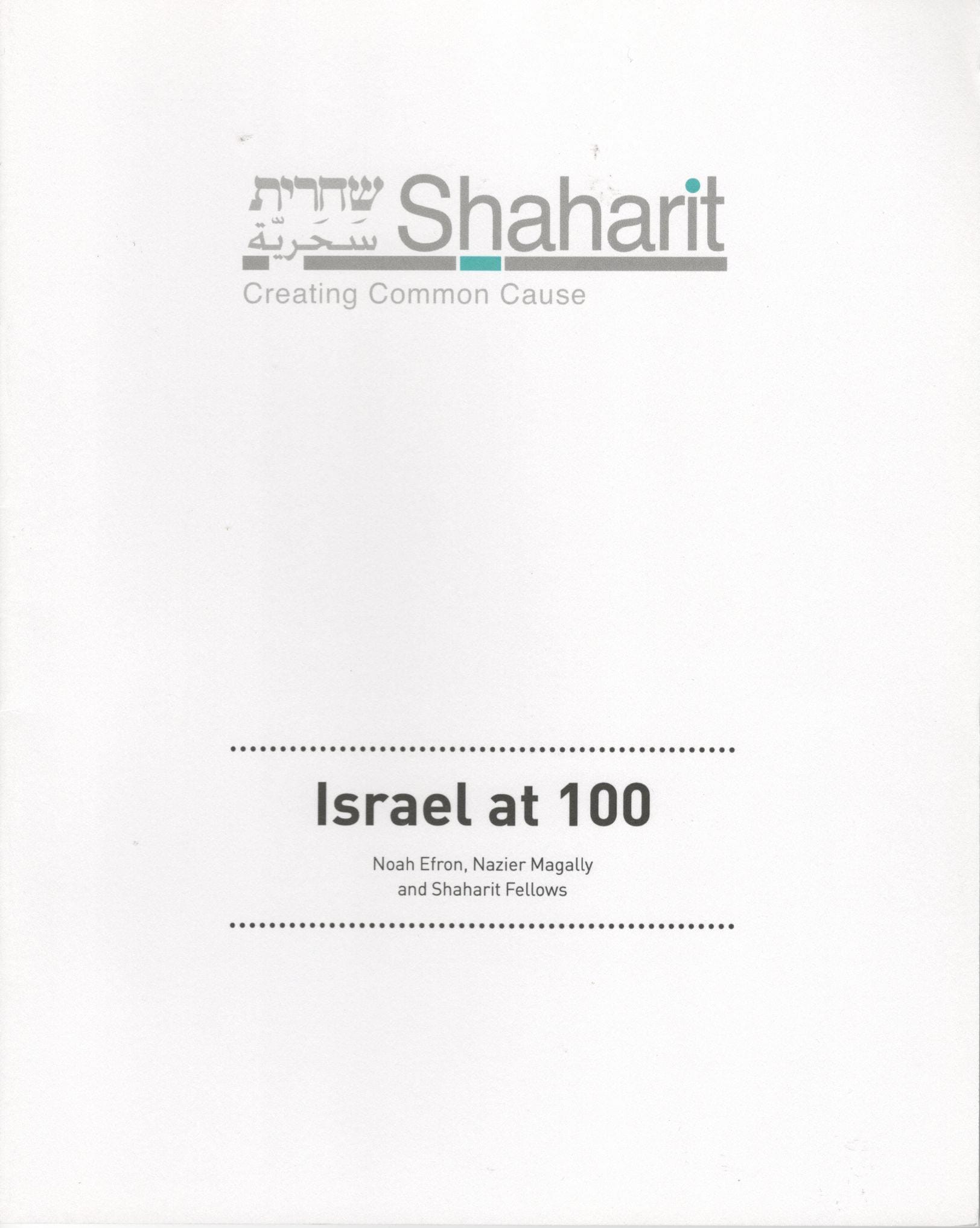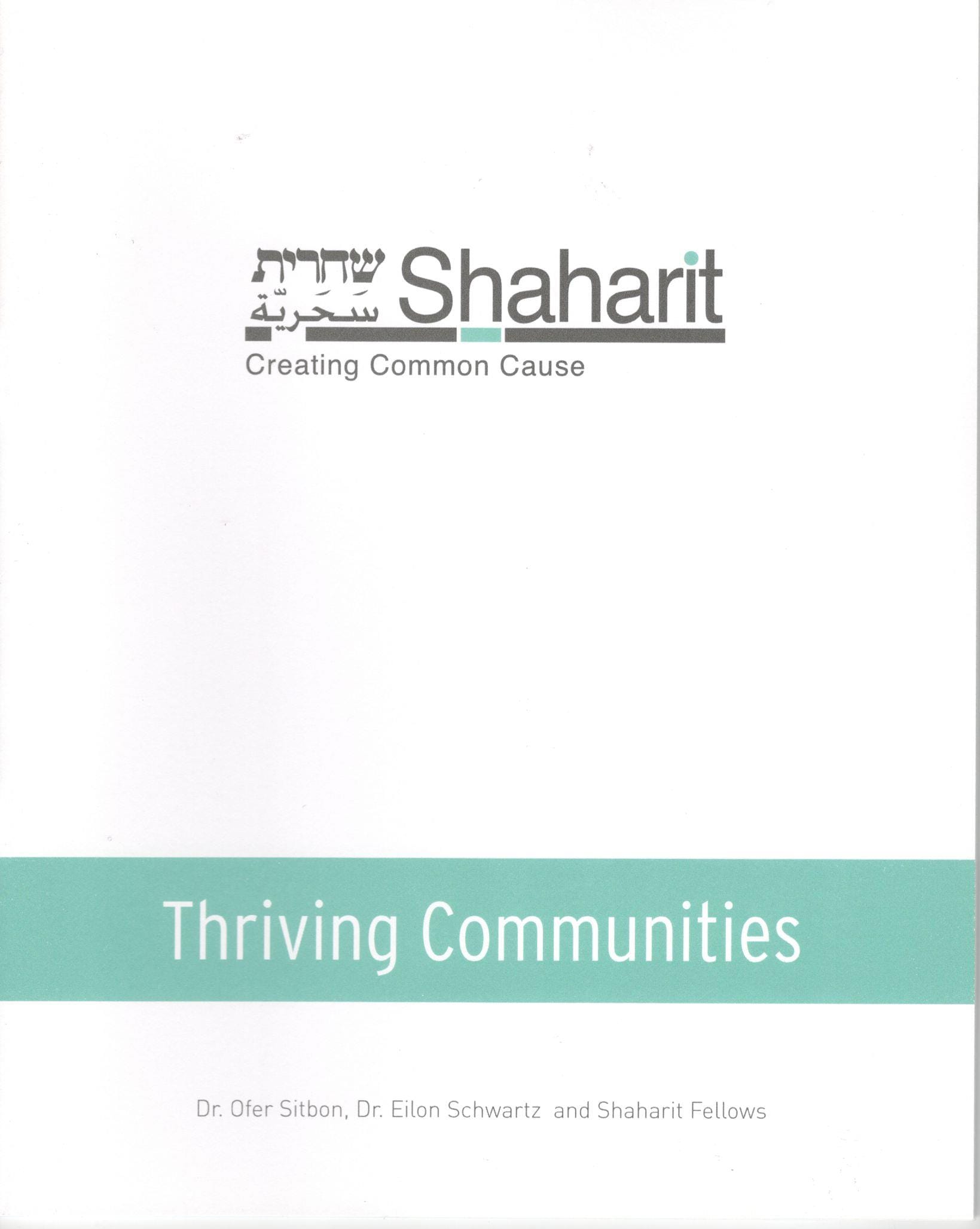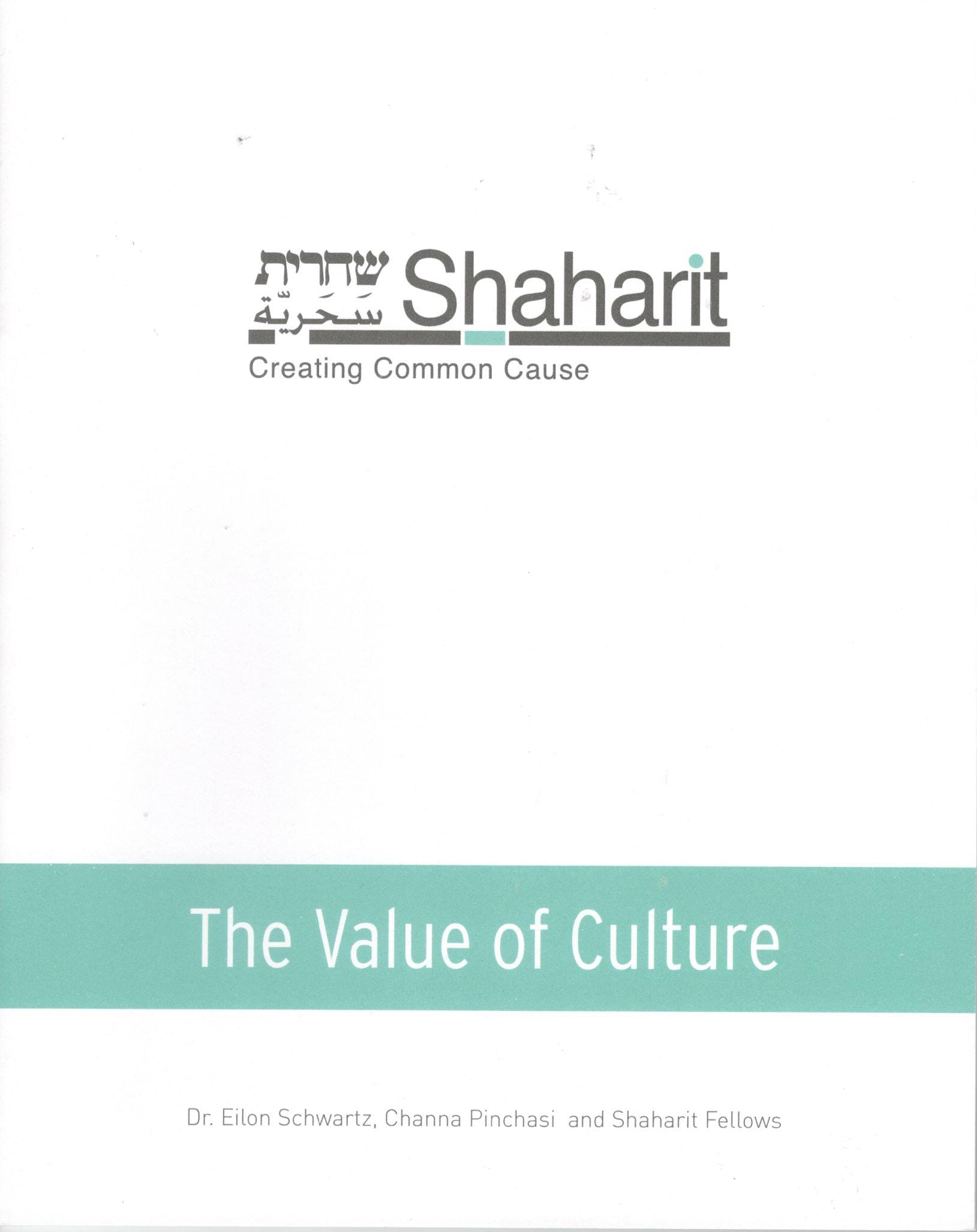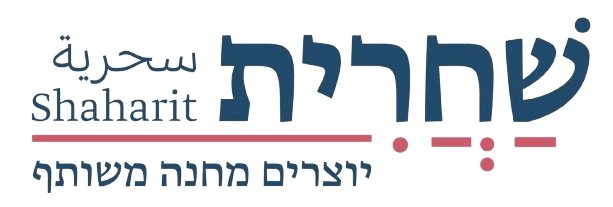BWelcome to the Jewish Funders Network 2015 International Conference.
If you have not already signed up, we invite you to join us for a special preconference event on Monday, March 16 from 10:00 A.M. to 12:45 P.M., which is hosted by the Nathan Cummings Foundation in partnership with UJA Federation of New York, San Francisco Jewish Community Federation and Endowment Fund, Arnow Family Fund, and Lautman Foundation. Join us just before election day for an intimate encounter with Shaharit and a special group of activists from across the social and political spectrum working to unite members of the very sociological “bubbles” that tear Israel apart. These include, among others, Nazier Magally, Arab journalist and commentator, and Racheli Ibenboim, Haredi social-change activist.
Below, you’ll find the event schedule as well as bios of our speakers. We’ve also included information about the work at Shaharit through several videos as well as our vision statements.
By necessity, we’ve presented only a small fraction of our work. We invite you to explore the rest of our website for a more complete picture of Shaharit’s efforts and to follow us on Facebook for the latest updates.
Breaking out of the Bubbles, Program Schedule
(Speaker biographies below)
10:10–10:45—Who Holds the Keys to Israel’s Future? A talk with Nazier Magally, Dr. Chana Pinchasi, and Dr. Lia Ettinger
10:45–11:35—Intimate roundtable conversations
- Religious Zionism—A new future for Israel’s new eliteWith: Tehilla Friedman Nachalon and Dvir Shwarzts
- Local Civic Engagement—Change begins at homeWith: Dvora Abramzon, Yaniv Cackon, Efrat David, and Randa Haj-Yahya
- Jewish Tradition and Human Rights—A meeting of the minds?With: Rabbi Gabi Cohen and Gili Re’i
11:45–12:15—Conversation with young leaders from Shaharit’s “120” program: Huda abu Obeid and Racheli Ibenboim,
moderated by Yael Gidanyan
12:20–12:45—Plenary discussion & conclusion
An Introduction to Shaharit
Shaharit: Creating Common Cause was founded as a home for a movement of Israelis from across the religious, ethnic, and social spectrum who are committed to forging a common future that embraces every community in our society. Our members are
concerned by the prevailing social and political culture, which is deeply fragmented by sectoral rivalry and lacks a sense of common purpose and shared identity. We believe that the spectacular diversity within Israeli society is this country’s greatest asset and most profound source of strength. By working together to transcend and embrace our differences we can ensure that Israeli society effectively addresses the needs of all its members, builds a renewed sense of shared purpose between all of the communities, and restores public confidence in our country and leadership. We call this result the “Common Good.”
Below, you can learn more about our projects and vision through videos of our work and selections from our intellectual work.
| An introduction to Shaharit, our vision and work | Highlights of the 2014 Shaharit Conference |
| Vote Your Voice: Shaharit’s campaign for the 2015 elections |
Selections from the Shaharit Library | |
 | Israel at 100Noah Efron, Nazier Magally, and Shaharit Fellows Israel is a place of contradictions. For many Jews, Israel is a dream fulfilled: a national home and a place of their own. It is also a homeland for Palestinians who also seek a state of their own. Israel is a boisterous democracy, with courts committed to humane, liberal values and a contentious watchdog press. It is also a country where discrimination, especially against Arabs, is commonplace. Israel’s economic success has been remarkable, from the agricultural miracles wrought by the collectivism of its early days to the “Start-Up Nation” it has become. But economic growth has left many behind, producing gaps between the powerful haves and the vulnerable and often alienated have-nots. Israel is a rich and splendid quiltwork of cultures – some woven here and some gathered from every corner of the earth – that together produce literature, music, arts, sciences and scholarship of world renown. Yet many see it as a culture in decline, newly reluctant to fund universities, libraries, theaters and museums. Israel is a land of extravagant natural beauty. But its landscape is blighted by strip malls and polluted water and air, as open spaces yield to the asphalt and concrete of thoughtless development. All these contradictions can equally fund hope and despair. |
 | Thriving CommunitiesDr. Ofer Sitbon, Dr. Eilon Schwartz, and Shaharit FellowsAt the juncture between the individual and his or her freedom and the state and its responsibilities, lies the community. There are many types of community: Some communities form through a shared attachment to a place—a neighborhood, village, city, or region. Others are formed through a shared heritage or unifying worldview. These latter arise at mosques, synagogues and churches, but also surrounding soccer clubs, choral groups, and factories. For many people, connection to a community is a source of identity, security, fulfillment, creativity, and happiness. |
 | The Value of CultureDr. Eilon Schwartz, Dr. Channa Pinchasi, and Shaharit Fellows Israeli society is seen as being shot through with countless fissures that threaten to tear the country to pieces. But what if we were to approach this multitude of fissures as a treasure to be capitalized on rather than as cracks to be mended? How would Israel’s “town square” look if public policy were to respect the place of each and every culture, not as an ultimate end, but as an opening, a starting point for a lively, colorful meeting of worlds and perspectives, which would ultimately change us all? |
Speaker Biographies
(in order of appearance)
Dr. Eilon Schwartz is the founder and director of Shaharit. He was among the founders of the Heschel Center for Sustainability, where he served as director until recently. In addition to his work at Shaharit, Eilon is a faculty member at the Melton Center for Jewish Education at the Hebrew University, where he teaches graduate courses in cultural criticism, social-environmental politics, and education.
Nazier Magally is a Shaharit Fellow as well as a teacher, writer and journalist and an activist on matters related to Arab-Jewish relations in Israel. He served as editor-in-chief of Al-Ittihad, Israel’s only Arabic-language daily. He presently is a member of the editorial staff of Eretz Acheret, a columnist about Israel affairs the London-based newspaper Asharq Alawsat, and the host of several news magazines on the Second Channel of Israeli television.
Dr. Channa Pinchasi is a Shaharit Fellow. In addition, she heads the Hartman Center’s Be’eri School for Teacher Education in Jerusalem. Channa writes frequent opinion columns, and her work appears in Ynet and Haaretz, among others. She lives in Efrat with her husband, Gili, and their two sons and two daughters.
Dr. Lia Ettinger is a Shaharit Fellow as well as the Academic Director of the Heschel Center and a faculty member of the Mandel Institute for Educational Leadership. She lectures widely on sustainability, globalization, and local economies.
Tehila Friedman-Nachalon is coordinator of “From Tribalism to Solidarity,” a working group of religious Zionist Israelis that meets under the auspices of Shaharit, and she recently finished a fellowship at the Mandel School for Educational Leadership. Tehila is one of the founders the “Yerushalmit” movement, which promotes Jerusalem as a strong, pluralistic, and inclusive city, and from 2010–2013, she chaired Ne’emanei Torah Va’Avodah, a religious-Zionist movement, which works to strengthen tolerance and openness in Orthodox Judaism.
Dvir Shwarzts is a member of “From Tribalism to Solidarity” as well as a student at Shalem College and the spokesman for Ne’emanei Torah Va’Avodah. He also volunteers at the Institute for Zionist Strategies as part of a team exploring issues of nation, state, and religion.
Yaniv Cackon is co-coordinator of Shaharit’s Civic Capital project and chair of Ashdodim, Ashdod’s civic-political movement.
Dvora Abramzon is co-coordinator of Shaharit’s Civic Capital. Previously she was a founder of the National Left movement and served as its spokesperson and fieldwork coordinator.
Randa Haj-Yahya is coordinator of Saharia, Shaharit’s Palestinian Arab working group. She strongly believes in the integration of Palestinian Arabs into Israeli society and in the untapped power of women, and she works to help women advance in Israel’s Arab society.
Efrat David is a social activist in Tirat Carmel focused on issues of local education. In 2013, she won a seat on the city council, where she aims to promote a public discourse based on public engagement and transparency.
Rabbi Gabi Cohen is deputy director of Ma’ayan HaHinuch HaTorani, a network of educational institutions affiliated with the Shas (ultra-Orthodox Mizrahi) movement. He is also a member of the “Jewish Tradition and Human Rights” working group at Shaharit and is on the group’s steering committee.
Gili Re’i joined Sikkuy in February 2015 after nearly two decades of experience in Israeli NGOs that address education, social change and human rights. She is also a member of the “Jewish Tradition and Human Rights” working group at Shaharit and has been a member of the group’s steering committee since its inception.
Yael Gidanyan recently completed her master’s thesis in Islamic and Middle Eastern Studies at the Hebrew University. She works on Shaharit’s Social Capital project and coordinates the “120” program; she also serves as chair of the board of the Interfaith Encounter Association.
Huda Abu Obaid is a member of the inaugural cohort of Shaharit’s “120” program for aspiring leaders seeking a new social partnership. This past year, she helped found a youth movement to oppose the Prawer Plan to regulate Bedouin settlement of the Negev while she worked at Sidra, an organization to promote the status of Negev Bedouin women.
Racheli Ibenboim is a member of the inaugural cohort of Shaharit’s “120” program for aspiring leaders seeking a new social partnership. She lives in Jerusalem’s Mea Shearim neighborhood with her husband and two children. During the 2015 election campaign, she been a leading activist in the “Lo Nivharot, Lo Boharot [Not Running, Not Voting]” campaign, which is protesting the absence of women candidates on Haredi party slates.
Miri Shalem is a member inaugural cohort of Shaharit’s “120” program and currently runs the Institute for Zionist Strategies. She lives in Beit Shemesh where she is a social activist, especially on women’s issues.



